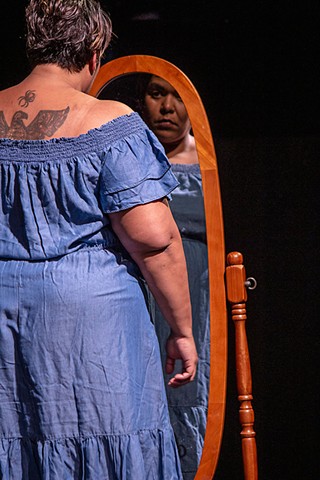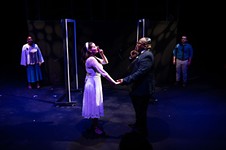Ground Floor Theatre's black do crack
In this new solo show, writer-performer Florinda Bryant shatters the myth that black women must go it alone
Reviewed by Robert Faires, Fri., March 1, 2019
The woman stands alone, still, caught in bursts of light like emergency flashers in a facility on lockdown. Sounds of phones ringing and fingers clattering on keyboards, amplified to harsh levels, almost drown out her voice as she runs through a string of phrases that seem related to daily routines: a question she asks when answering the phone on the job, a query of a co-worker on break. She's smiling as she asks the unseen caller, "How can I help you today?" and the cheeriness appears sincere, but there's also a tension evident behind it, a sense of this woman working to hold it together in the face of the punishing noise and glare. And as it goes on and on, and the same scene is repeated again and again, it becomes clear that the biggest part of her daily routine is the pressure, the relentless force pressing down on this woman, squeezing the breath out of her, the very life.
But then, to describe it as a single force doesn't do justice to the stress this woman – this black woman, it must be noted – is under; it is not one force but many forces: sexism and racism, most often in a toxic mix; single parenting; poverty; life-threatening medical conditions (which can't be treated properly because of the poverty); and a lifetime of being told that she is expected to "keep on pushing on" with no help, except whatever God may provide.
In black do crack, a new solo work that Florinda Bryant seems to have written in her own blood, the strains she depicts are at once deeply personal and representative of black women throughout this land. When Bryant speaks bitterly of being passed over by a white supervisor while white women with less experience receive raises and promotions, you can easily imagine this being drawn from the writer-performer's own life and from the lives of countless peers of hers. The same goes for her tales of working multiple jobs just to keep her children fed, the painful decision to skip buying medicine that she needs for her high blood pressure because she needs the money for her family, of having to skip work to care for a child and being punished for it when white co-workers with kids never are. When Bryant stands soaked in red light, balling her fists and letting fly a scream of rage, we can see hundreds, thousands, hundreds of thousands of black women in the shadows behind her, and she is no more alone when she shows herself numbing her pain, pulling from her bra bottles of booze, and then a cigarette, and then cocaine.
In giving voice and presence to these cruelties crushing African-American women, black do crack is powerful enough. But the situation it addresses that makes it still more potent – and vital, to borrow a term from an audience member at the performance I saw – is black women believing that they must shoulder their burdens alone, without aid, and that doing otherwise is to be weak or, worse, mentally unsound. "I'm not crazy," Bryant insists to an unseen therapist when her character seeks counseling, and the defensiveness in her voice is heartbreaking. Of course, she isn't – but that's the message that's been hammered home inside the culture for as long as she's been alive: Black don't crack. With this work, Bryant aims to shatter that myth, to shout that it's time to reach out and find support and assistance. As the show ends, Bryant has turned from the notion that, because her life is so hard, God must not love her to the belief that love is there and waiting. She stands confidently in the spotlight, and though she may stand by herself on the stage, she knows – and we know – she is surrounded by helping hands.
black do crack
Ground Floor Theatre, 979 Springdalewww.groundfloortheatre.org
Through March 2
Running time: 1 hr.













